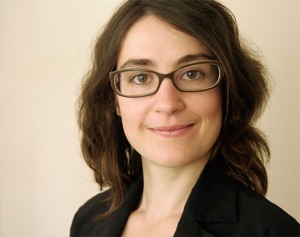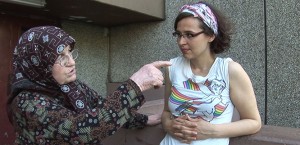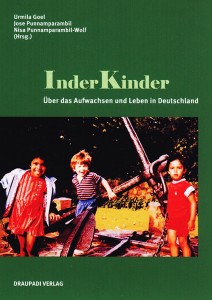Tomorrow evening, 9 September 2014, the cultural anthropologist Alina Gromova will present her book “Generation ‘kosher light’” (transcript Verlag 2013) in the Academy of the Jewish Museum Berlin. As in the case of the many other authors whose “New German Stories” we recently discussed, we put three questions to Ms. Gromova prior to her reading:

Alina Gromova © Judith Metze
Alina, for your study of an international group of young Jews in Berlin you took the city itself as your springboard. Exploring the locations where your subjects live, hang out, mingle and party enabled you to chart their diverse notions of identity, tradition and religion. Why did you opt for such an explicitly spatial focus?
Identity and tradition are terms often difficult to grasp, because they are interwoven with symbols, values, wishful thinking or memories. A space, however, has not only a symbolic but also a physical dimension and is therefore more palpable. Personally, I don’t see a space as a 3-D void waiting to be filled by people or things. On the contrary, people and things are what create a space in the first place. And urban space is especially fascinating, I find, because a broad cultural and religious spectrum often occupies one and the same spot, however tiny; and different elements simultaneously give rise there to their own spaces, so the result is a palimpsest of spaces that then interconnect.
→ continue reading

Canan Turan with her grandmother
© Adriana Uribe
In our series of events “New German Stories” we present different perspectives on the immigration country Germany. That immigrants from Turkey, Vietnam, Poland, India and Cameroon and their descendants have stories to tell is nothing new—the novel twist is, that they present them here as German stories. On Tuesday, 8 July, director Canan Turan will be a guest of the Academy of the Jewish Museum. In her film KIYMET, she tells the story of her grandmother, who migrated to Berlin from Turkey in the early 70s. We asked Canan three questions about her project:
How did the idea to make a film about your grandmother Kıymet come about? → continue reading
Dealing Creatively with Ethnic Classifications

Book cover
© Draupadi Verlag
Tomorrow at the Academy of the Jewish Museum Berlin, Urmila Goel and Nisa Punnamparambil-Wolf will introduce the book they edited, InderKinder – Über das Aufwachsen und Leben in Deutschland (Indian-Children: on Growing Up and Living in Germany, published by Drapaudi Verlag). It’s the third in a series of events on “New German Stories” where, with the aid of individual biographies, we examine Germany’s historical and current status as an immigration society. On this occasion we’ll focus on the children of immigrants from India, who gained public awareness for the first time during the “Green Card” campaign of 2000.
Prior to the reading and discussion tomorrow, we asked the two editors, Nisa Punnamparambil-Wolf and Urmila Goel, three questions:
What made you choose this title?
We’re referring with this title to the marginalizing “Kinder statt Inder” (children instead of Indians) campaign of the year 2000. The wordplay of InderKinder (Indian-children) is meant ironically: it was important to us to find a creative way to deal with these attributions. With the book, we want to show the varied ways that people who grew up and live in Germany handle the classification of being a child of Indian immigrants.
The book consists of two parts, autobiographical stories and essays. How would you explain your concept?
→ continue reading


